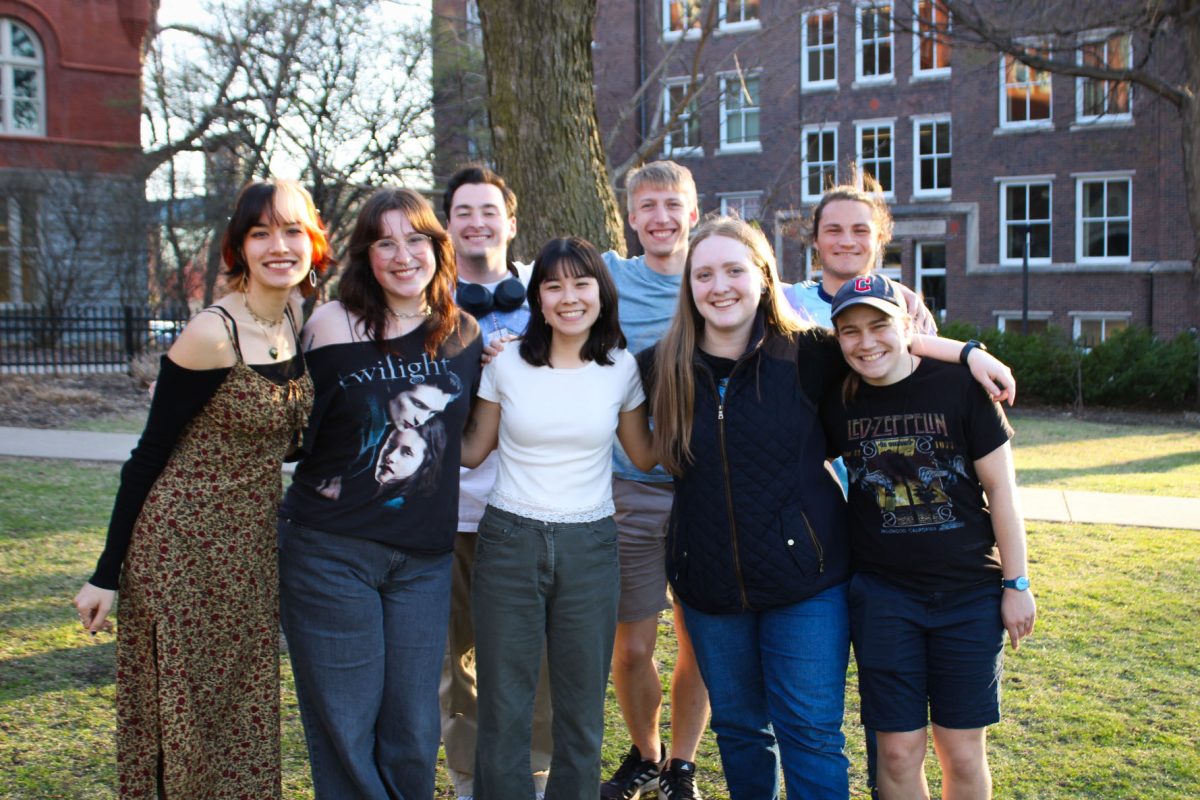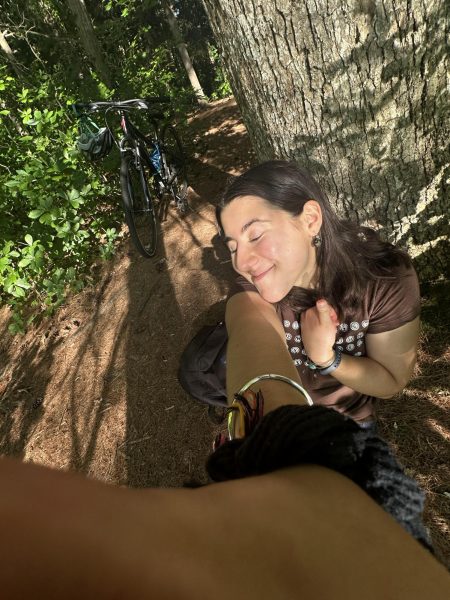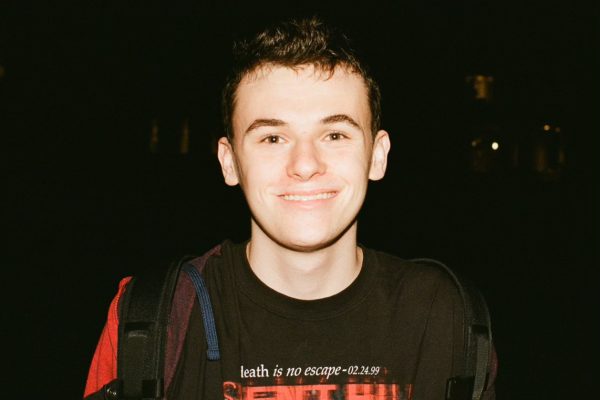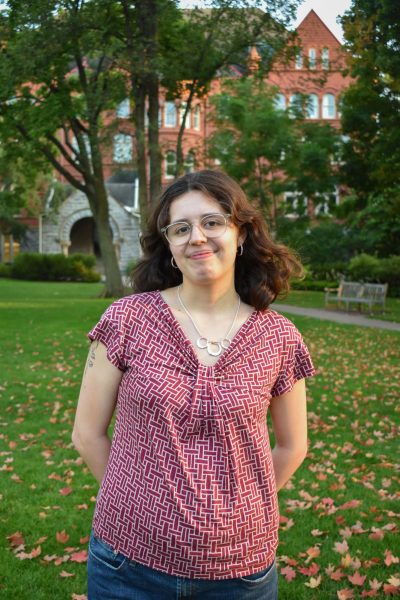As is our yearly tradition, we spoke with The Mac Weekly’s graduating seniors about their time on the paper. These seniors have been talented writers, editors and leaders.
The following interviews have been edited for clarity and length.
The Mac Weekly (TMW): Why did you first join The Mac Weekly, and what made you stay?
Lauren Petro: I used to write for my school newspaper in high school, and I wanted to continue that, and I never got around to doing it my freshman year. But then I was looking at more clubs to join and I was like, “You know what? [I’m] finally just going to do it.” And here we are.
Justine Ballard (JB): I had quit Mock Trial, and I was really looking for something to do. And the war in Ukraine started, and that hit really close to home for me. I was looking for a place to go, a community, for space. … I saw an ad in the Mac Daily calling for opinion writers, from Jonah Wexler [’23], being like, “Hey, if you want to write an opinion, reach out to me.” I was like, “Hi, I want to write.” And he told me to show up. I showed up, and I copy-edited that first night until, I think, 11 o’clock at night. I just kept showing up, and I found the community that I’ve been looking for.
Gabby Simpson (GS): I’ve submitted comics since freshman year, although I never stepped foot into the office until my junior year. … Justine convinced me to finally go in the office, and was like, “You’re technically a staff cartoonist, so you should go in and write.” … I knew I wanted to write, and I was just too scared to. But then once I did, I realized how much I liked it. And then I never left.
TMW: How has The Mac Weekly impacted your overall college experience?
Noah Riccardi (NR): This campus really has a richness of stories and life. It’s pretty small as colleges go, but you wouldn’t be able to get a holistic view of it, really, just as one individual. You have four years here, plus or minus. But, being part of the paper, you get this weekly selection of this campus’ stories and stories from the cities as well, and it’s really rewarding to get that kind of view, that really wide view that you would not otherwise have.
Nick Miller (NM): I think a lot of times with extracurriculars in Macalester, they are things that I would want to pursue in a very casual setting. … But starting to submit crosswords, I recognized that it would be something that I’d want to pursue for a much longer period of time. It’s a skill in which I take pride, and [I take] pride in the fact that, within this space, I could cultivate something that I learned I was passionate about.
GS: I think something unexpected was me doing media. I went in and I wrote nearly every week when I first joined. And I was so into it. Then we had a gap in media editors, and I, convinced by Justine again, was like, “Sure, I’ll take it up. I kind of know how to use Photoshop. I could do this.” Now I love Photoshop, and I’ve fallen back in love with digital art, which I did as a kid, and then kind of wrote it off for a while. But it’s interesting how the newspaper has gotten me more in tune with my artist self.
Olivia Worcester (OW): I think for me, it’s given me a sense of, it sounds so cheesy, but a sense of community and belonging on campus, and I feel like it’s been such a nice outlet and support network. At the same time, I feel more informed about campus activities and news being a part of a, whoa, news organization. Who would have thought? But yeah, it’s given me the opportunity to grow as a writer and also make new friends, which has been so nice.
Mandy Week (MW): I think one of the biggest things that I have learned throughout my time at the paper is the value of relationships. And I’m speaking beyond just having reliable sources of information, or people that you can talk to who will be able to help you out with this story, but really learning how to connect with people, learning how to listen, how to trust, how to support one another, how to ask questions, how to vocalize your needs. I think that’s something that I will carry on throughout the rest of my life.
TMW: What are some highlights or favorite memories of your time at The Mac Weekly?
Rylan Mueller: I’ve interviewed some people that I have a casual relationship with on campus, you know, I just run into them, we chat. There is someone I was interviewing for an article recently, and he said after the interview, “These were super thoughtful questions. And now I’ll look at you with this newfound respect.” And hearing that from someone, from a staff member here, was really fulfilling.
JB: In my fall [of my] sophomore year. I was Ad Manager while Jonah [Wexler ’23] and Kamini [Ramakrishna ’24] were EICs. We got an Hourcar, the three of us, and we went out to a corn maze on the outskirts of the Twin Cities. We hung out for an afternoon, … [I felt like they were] not just colleagues, but friends and people I will go to for years to come.
NM: I have a very, very fond and strong recollection of the most recent “Mock Weekly,” because from an outsider perspective, you all are extraordinarily ensnared in the constant goings-on, and pressure, and stress and kind of effort that it takes to manage the paper, and one time, you can throw the gravitas of journalism out the window and start to scheme and plot. And immediately, the atmosphere changes very, very dramatically, to a bunch of people who secretly wanted to be silly the entire time [who have] finally gotten a comedic outlet that a decent number of students will read.
TMW: Nick, that was the most beautiful description of the Mock I’ve ever heard.
TMW: What Mac Weekly work or moments are you most proud of?
GS: Having my first thing ever published in the paper was a really proud moment. It was freshman year, and … I just sent in the comic to the Arts section, and then when it came out, I was so excited to go find the paper, and it was on the entire back page of the paper. My comic that I drew, they blew it up to the entire back page. … It was such a fulfilling moment to look at something and open it up and see your name and your work printed [so] that people can see it and circulate. One of my professors knew me from that comic because he read it.
OW: Something I’m most proud of was this article I wrote last fall about the “Rocky Horror” shadow cast in Minneapolis, Transvestite Soup, and I was just really proud of myself for pushing myself out of my comfort zone and cold emailing them. Granted, they’re all very friendly people, and I hoped that would be the case, but I was still nervous and thought maybe they wouldn’t respond or reach out. This was the first article I’d written where I was reaching out to people for an interview for [the] piece. When they did respond, I had the opportunity to facilitate this whole big group interview—a lot of the cast showed interest in being a part of this piece, which was really awesome. So I was really proud of the way that I conducted that interview, and was really proud of the piece and how I was willing to put myself out of my comfort zone. I received a lot of positive feedback from the shadow cast about the piece. And so that was really gratifying.
Kaliana Andriamananjara (KA): There are a lot of articles that I’m proud of having had the privilege of reading and editing. A lot of the ones about Palestine and about ICE, and just the political going ons around campus. I think those are really important articles, and I’m glad that I had the chance to help push them forward toward being published.
JB: [The] editorial at the end of last spring. Obviously, I don’t think any of us specifically wrote it, but that was a big moment of bringing something to the forefront that we had been dealing with for a year, and bringing campus attention to it. We had talked with a lot of different people across campus about it, and we had a lot of people on our side and backing us up. That was a really proud moment. I felt really good about that one. I think there’s a lot of like, things that have happened within the paper, not necessarily that I have done that I’m proud of, but like other people have done that I’ve been proud of. So like, [our] work with MUWU, or things around … everything happening with … the country’s administration, like all of this coverage. So those have been really impressive to me, stuff like that. So just proud to have been part of it and to have been here with all of you.
TMW: What will you miss the most about working on The Mac Weekly?
NR: The thing that’s pushing you every single week to go and look, to find a story and then really give it the effort and bring it to life to the best of your ability.
JB: You guys! I mean, obviously you all are also graduating, so you also won’t be in the paper, but just the people and like getting to work with all of our editors and writers … week in and week out, straight through 13 weeks every semester, like everybody just showing up, putting in the work, producing really good quality journalism, and just creating a community that for the most part is really supportive and uplifts each other. I’m gonna miss having that community.
TMW: What advice would you pass on to future Mac Weekly generations?
NM: I think a big thing is: a continuation of the fostering of community spells for the longevity of the paper. I think no one will want to be in a space where we’re all doing our own thing, kind of isolated or doing parallel play. I think that the joy that people have gotten, as indicated [by] this interview, is the fact that there’s communal struggling and communal joy. The underlying theme here [is] community and a great group of people to foster a community with. So if I think, even if everything else dissipates, that should be the foundation.
OW: Bars.
GS: Try new things. Volunteer for an article that you are maybe unsure about. It might be more valuable than you think. And you’ll learn things, and people will recognize you, and you’ll start to make connections that are not only within the office, but outside the office.
KA: Don’t be afraid to ask questions.
MW: One thing I’d really emphasize after four years on the paper is that we all have something to teach and learn from one another. I know that this gets said a lot, but I think that every single person who sets foot in our office brings with them a unique perspective and their own experiences, and I think that there’s a lot of value in listening to what every single person has to say. I think that every interaction I’ve had in the office has shaped my approach to my work and to my life, and I hope that I’ve done the same for other people.
TMW: What do you hope for The Mac Weekly in the future?
MW: I hope that the paper continues to prioritize making the office an inclusive, welcoming space. We have had periods of time where we’ve seen a lot of people step away because they feel excluded. I think we’ve made a lot of progress in not having that kind of reputation, and I hope we keep up that work, because I think that’s how we include as many voices in the paper as we want.
JB: This is a hope that’s been expressed in past senior spotlights by past seniors … but I hope we work on building relationships with other newspapers and other student newspapers across the Twin Cities. There is a wealth of resources and knowledge and understanding on … how to cover things, how to foster relationships with admin [and] with the Twin Cities area. To build those connections and stand in solidarity with one another, I think it’s something that is vital, and I regret I didn’t have much [of a] chance to do when I was here, and is something that I hope more people will work towards in the future. … [And an] all crossword edition. No stories, only crosswords.
NM: Do not let them go back to the 15 by 15 [crossword]. Keep the 21 by 21. Don’t let them do one- or two-letter answers. I will come back. I’ll berate them.
OW: I’m excited to see what future editorial boards do with the paper. I look forward to reading it as a Mac graduate.
*The Mac Weekly would also like to thank Carling McQuinn, Finn Veerkamp, Leyden Streed, Evan Trier and Gwen Reoch for their contributions to the paper during their time at Macalester.















